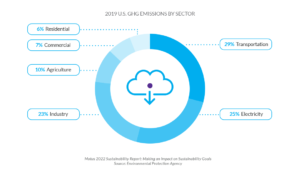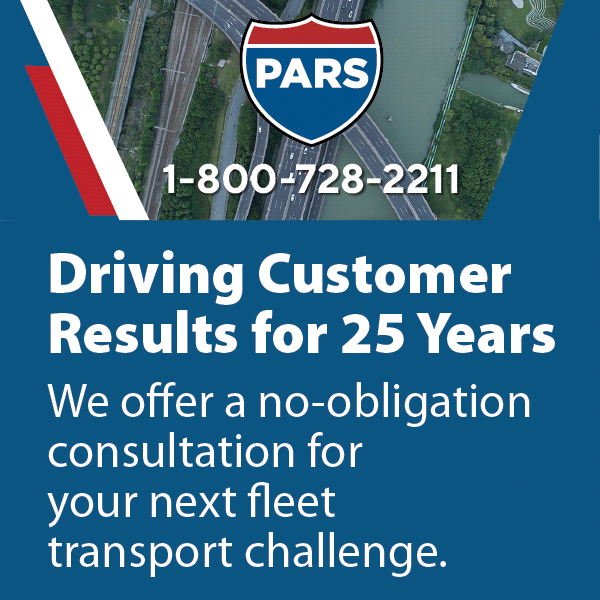
February 13, 2022
Insights Reveal Strategic Approaches to Reducing Environmental Impact that Increase Competitive Advantage, Improve Resource Efficiency and Drive Better Business Outcomes
Motus today released its Sustainability Report. The report informs business leaders which actions most impact their carbon footprint and identifies opportunities to enhance sustainability initiatives. Motus compiled insights into direct and indirect influencers that contribute most heavily to greenhouse gasses and the effect of upstream and downstream business activities on the environment.
“Corporate sustainability is a key indicator of overall business performance, and every company should have a baseline measurement of its greenhouse gas emissions,” said Ken Robinson, market research manager at Motus. “A company’s carbon footprint often reflects the efficacy of its core business resources, such as vehicles, devices and facilities. Once business leaders identify areas making the largest environmental impact, they can implement policies, track progress and confirm their actions are supporting a swift reduction of carbon emissions.”
The report summarizes key considerations business leaders should act on to drive transformational impact for organizations that seek to reduce energy consumption and greenhouse emissions. In addition to reducing vehicle emissions, the report found that strategic approaches to mobile device recycling and clean energy investments can immediately improve an organization’s economic and environmental positions.
The Private Sector’s Role in Achieving National Sustainability Goals
 With the White House setting a goal of halving economy-wide greenhouse gas emissions by 2030, there is greater urgency for organizations to begin measuring and reducing their carbon footprint. According to the report, the transportation sector accounts for the largest share of greenhouse gas emissions in the United States. A typical light-duty business vehicle emits 5.2 metric tons of carbon dioxide per year. In addition, employees that do not drive frequently for business still average 53 commute miles every day to get to and from the office.
With the White House setting a goal of halving economy-wide greenhouse gas emissions by 2030, there is greater urgency for organizations to begin measuring and reducing their carbon footprint. According to the report, the transportation sector accounts for the largest share of greenhouse gas emissions in the United States. A typical light-duty business vehicle emits 5.2 metric tons of carbon dioxide per year. In addition, employees that do not drive frequently for business still average 53 commute miles every day to get to and from the office.
Companies that focus on reducing their vehicle emissions can make a significant environmental impact. The report identifies steps business leaders can take today to begin making a difference. For instance, organizations can start by analyzing business driving habits, routes and territories to optimize mileage, minimize wasted trips and change inefficient driving behaviors. Furthermore, companies that take a modern approach to office space and allow three remote days per work week can eliminate over 1.6 metric tons of carbon dioxide per employee per year.
Zero-Emissions at Scale: Fleets and Large Groups of Business Drivers Instrumental to Carbon-Neutrality
Transitioning business mileage to zero-emissions is a significant undertaking and should remain top of mind for organizations that rely on fleets or large groups of business drivers. Emerging vehicle choices are evolving beyond hybrid. All-electric vehicles are providing companies with environmental and financial benefits. According to the report, traveling 100 miles in an EV is up to 75% less expensive compared to a gas-powered vehicle. While the purchase price and cost to insure an electric vehicle are both greater than a comparable gasoline vehicle, there are federal and state tax credits and rebates to help offset acquisition costs. Additionally, federal and state governments offer charging station incentives and electricity discounts.
“Carbon neutrality is a substantial transformation that can only be achieved through tactful planning,” said Robinson. “Electric vehicles may not be a viable option for all companies right now, but business leaders can take action in other areas to put them on the path to reducing their carbon footprint.”
The rapid adoption of WorkAnywhere strategies has led to an increase of company-provided devices and mixed-use assets. These can have a significant impact on the environment when not properly disposed of. Up to 80% of a phone can be recycled, and the metals, plastics and batteries in smart phones can be used in new products, reducing the amount of raw materials mined over time. According to the report, for every million smart phones recycled, 35,274 pounds of copper can be recovered. Motus found that the average company-provided device is upgraded every 30 months, and legacy devices are often not returned to IT teams. The average residual value of these devices is approximately $207. Motus estimates the residual value of legacy devices upgraded in 2020 alone exceeded $4 billion. Deploying a strategy to ensure legacy devices are returned and properly salvaged is both economically and environmentally beneficial.
“The journey to a zero-emissions world begins with an assessment of an organization’s current state,” said Robinson. “Businesses today are in prime position to take steps forward to affect long-term positive change that can reap benefits to both the bottom line and the world we live in.”
To download the full Motus Sustainability Report, visit: https://resources.motus.com/reports/2021-motus-sustainability-report.



